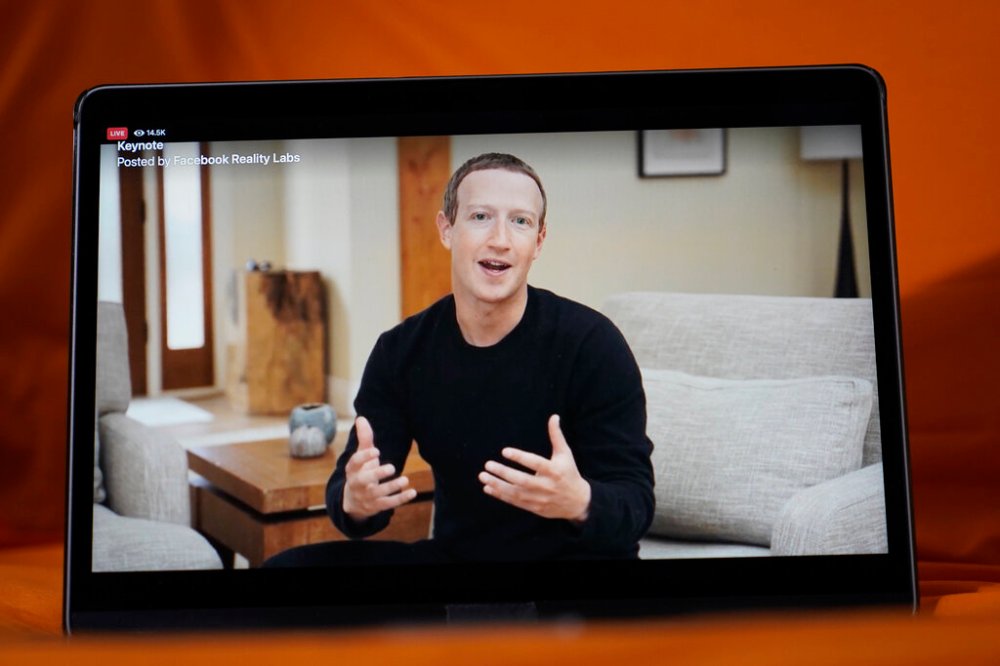Rebranding won’t solve Facebook’s problems
Read this article for free:
or
Already have an account? Log in here »
To continue reading, please subscribe:
Monthly Digital Subscription
$0 for the first 4 weeks*
- Enjoy unlimited reading on winnipegfreepress.com
- Read the E-Edition, our digital replica newspaper
- Access News Break, our award-winning app
- Play interactive puzzles
*No charge for 4 weeks then price increases to the regular rate of $19.00 plus GST every four weeks. Offer available to new and qualified returning subscribers only. Cancel any time.
Monthly Digital Subscription
$4.75/week*
- Enjoy unlimited reading on winnipegfreepress.com
- Read the E-Edition, our digital replica newspaper
- Access News Break, our award-winning app
- Play interactive puzzles
*Billed as $19 plus GST every four weeks. Cancel any time.
To continue reading, please subscribe:
Add Free Press access to your Brandon Sun subscription for only an additional
$1 for the first 4 weeks*
*Your next subscription payment will increase by $1.00 and you will be charged $16.99 plus GST for four weeks. After four weeks, your payment will increase to $23.99 plus GST every four weeks.
Read unlimited articles for free today:
or
Already have an account? Log in here »
Hey there, time traveller!
This article was published 29/10/2021 (1500 days ago), so information in it may no longer be current.
Don Draper, the fictional advertising executive from the television show Mad Men, famously said, “If you don’t like what’s being said, change the conversation.”
Facebook has made billions of dollars selling ads around the world on its social media site and affiliated apps. On Thursday, it decided to follow the TV-drama pitchman’s sage advice.
Mark Zuckerberg, Facebook’s chief executive officer, changed the name of the company to Meta, and in so doing attempted to change the recent conversation that has revealed darker aspects of its popular subsidiaries, such as Facebook, Instagram and WhatsApp.
.jpg?w=1000)
The move, clearly, is a cynical attempt to shift attention away from Facebook whistleblowers, former employees of the company who have presented thousands of internal documents to media outlets and governments around the world and have sparked a Facebook backlash.
The whistleblowers’ documents detail how the social-media giant’s algorithms — the system it created to distribute posts to Facebook users — favours extremist content and misinformation in order to heighten user engagement. The result is more ads are placed in front of users’ eyes, which bolster the company’s bottom line.
Among the former Facebookers is Frances Haugen, a former product manager, who says Facebook and its apps amplify false information and harmful content its users share.
The Washington Post published a series of stories about Facebook’s practices earlier this week, based on the whistleblowers’ documents, and the details paint a frightening picture.
A notable example was how those who attacked the U.S. Capitol in Washington, D.C. on Jan. 6 used Facebook to organize the riot and also attract others to join in.
Ms. Haugen’s documents also revealed how Facebook executives were well aware about how COVID-19 vaccine misinformation flowed through its apps and who spreads it. When members of the U.S. Congress demanded greater transparency and to know how much money Facebook made from distributing the falsehoods, Mr. Zuckerberg and his company stonewalled.
Ms. Haugen also revealed how Facebook has whipped up extremist users in other countries and how polarizing posts often aid authoritarian regimes.
She said Facebook has misrepresented data to investors and advertisers, excluding details about how fewer teens are using its services and how young people are spending less time on their apps and creating fewer posts.
It will take far more than a new name to transform Facebook into Meta and become the utopian “metaverse” that Mr. Zuckerberg desires for his company and its users.

Government regulation of social media has been posed as a way to increase transparency of social-media companies and how their products serve their users. Government oversight of private companies creates its own set of concerns, however, such as the threat of curtailing freedom of speech.
A better solution would see Meta and other social-media companies clean up their own online backyards.
When Meta employees study how extremist views are disseminated on its apps, the company should act decisively to prevent their distribution and to curb such behaviour rather than devising strategies to maximize the profits they create.
Telling Meta users, and the public at large, that there is no room for extremism and disinformation on Facebook is the first step to rebuilding trust in the newly named company.
That might be a changed conversation worth listening to.







.jpg?h=215)